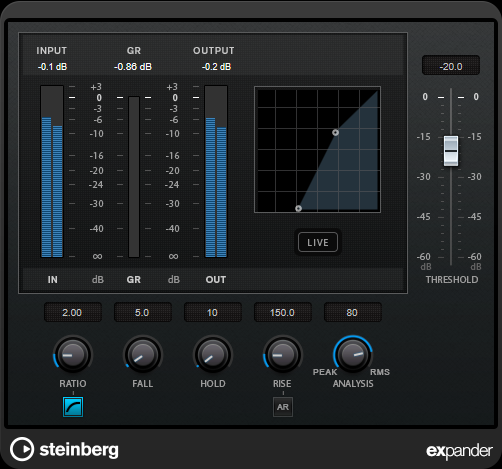Expander
Expander reduces the output level in relation to the input level for signals below the set threshold. This is useful if you want to enhance the dynamic range or reduce the noise in quiet passages.
You can either use the knobs or drag the breakpoints in the graphical display to change the Threshold and the Ratio parameter values.

- Threshold (-60 to 0 dB)
Determines the level where the expansion kicks in. Only signal levels below the set threshold are processed.
- Ratio
Sets the amount of gain boost applied to signals below the threshold.
- Soft Knee
-
If this button is deactivated, signals below the threshold are expanded instantly according to the set ratio (hard knee). If Soft Knee is activated, the onset of expansion is more gradual, producing less drastic results.
- Fall (0.1 to 100 ms)
Determines how fast the expander responds to signals below the set threshold. If the fall time is long, more of the early part of the signal passes through unprocessed.
- Hold (0 to 2000 ms)
Sets the time the applied expansion affects the signal below the threshold.
- Rise (10 to 1000 ms or Auto mode)
Sets the time after which the gain returns to its original level when the signal exceeds the threshold. If the Auto Rise button is activated, the plug-in automatically finds the best rise setting for the audio material.
- Analysis (Pure Peak to Pure RMS)
Determines whether the input signal is analyzed according to peak or RMS values, or a mixture of both. A value of 0 is pure peak and 100 pure RMS. RMS mode operates using the average power of the audio signal as a basis, whereas Peak mode operates more on peak levels. As a general guideline, RMS mode works better on material with few transients such as vocals, and Peak mode works better for percussive material with a lot of transient peaks.
- Live
If this button is activated, the look-ahead feature of the effect is deactivated. Look-ahead produces more accurate processing, but adds a specific amount of latency as a trade-off. If Live mode is activated, there is no latency, which is better for live processing.